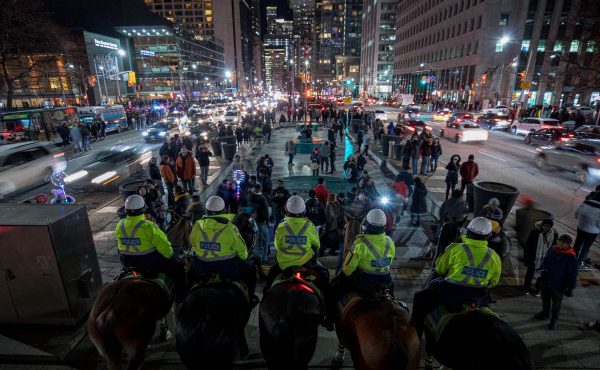Two key figures in the Ford administration have signaled their willingness to take on a Herculean task that, politically, only a right-wing administration is likely to get away with: taming the police budget. In doing so, councillors Michael Thompson and Mike Del Grande have sounded the right notes.
Specifically the councillors — Thompson the vice-chair of the police services board and Del Grande a soon-to-be member of that board — have argued that Toronto needs to determine how big a police force we need to keep Toronto safe rather than whether or not the City employs an arbitrary number of police officers. Yet what the Toronto Police Services Board did Monday night is the opposite of the structural change Thompson and Del Grande have been promoting, and could cause much greater harm to Toronto’s police service than a reduction of officers.
Going into Monday’s Police Services Board meeting, the Ford administration was demanding a flat-lined budget. This comes one year after Chief Bill Blair had successfully pushed back on the demand for a 10% cut in the police budget, which ultimately ended in Ford agreeing to a small increase with the promise from the chief that there would be a two-year strategy to get to the -10% target. Throughout the past year, Del Grande has been the most vocal proponent of a review focused on the number of officers required to police Toronto. He rightly argues that Toronto’s crime rates have long been trending down, likely due to the city’s demographics, which aren’t expected to change dramatically for the foreseeable future.
Though starting the conversation about how to bring some order to the police budget is courageous given the need for councillors to maintain a strong relationship with the officers in their communities, the Band-Aids used to hold together the 2013 police budget reveal a year largely wasted on talk when action was needed.
For 2013, the notion of a 10% cut over two years is a distant memory. Whether anyone ever thought a $100 million budget cut for the police service could be achievable without unrealistic concessions coming out of the Toronto Police Association’s collective agreement (which isn’t up for negotiation until the next term of council) is highly questionable. Realistically, since the collective agreement Ford hailed at the beginning of his term as evidence of his respect for police officers created a $24 million pressure on the 2013 police budget, just freezing the TPS budget this year is a big task without reducing the number of officers on the force. That task is so big that, in spite of the rhetoric of the police board members, it still isn’t finished.
Nearly $19 million of cuts was needed to bring the budget in at the same level as 2012. Instead, the police board agreed to $13 million in cuts, leaving $6 million still be determined. The board’s big hope for the final $6 million is to have council permit the police service to keep its 2012 budget surplus, which would be an exception to City of Toronto policy and a strategy that Del Grande — also chair of city council’s budget committee — has shot down (though he has no unilateral decision-making power in this respect).
On the off chance that the police board is allowed to keep its 2012 surplus for 2013 operating (something the accountants might actually consider an increase in the 2013 operating budget), it would be the least concerning part of the $19 million needed to get to a zero increase. The $13 million in cuts approved Monday night is full of short-term thinking because it hits budget lines that are unsustainable over even the medium-term. The $13 million is cobbled together by deferring payments into a reserve fund used to maintain police vehicles and equipment, freezing promotions and hiring, and cutting premium pay (often premium pay is needed for policing exceptionally large events like festivals, protests, etc). As economist Don Drummond advised Premier Dalton McGuinty’s provincial government in his report on how to reduce the cost of public services, these are the types of nickel-and-dime budget cuts that doom a public service. If a government is going to cut costs – and that is not at all the only option available to governments dealing with fiscal dilemmas – Drummond advised that it should come through restructuring service delivery rather than making short-term cuts that will lead to long-term spikes in spending.
So, for example, when the board froze hiring and promotions, the board agreed to create gaps in their staffing structure that will have to be filled at some point in the future. Without a change to the way the TPS is organized, the money saved in 2013 will be back on the books within the next couple of years.
If Thompson and Del Grande use the 2013 budget as the bridge to major changes in the size and organization of the Toronto Police Service for 2014 then their decisions can be defended. But if this is like years passed, where strategies to reign in police spending are promised but never executed, the gimmicks used to balance the 2013 budget will have caused harm to both the police service and Toronto’s fiscal foundation.
photo by Toronto Archives





4 comments
Rob Ford wants less police, so he can continue to drive holding his cellphone and pass streetcar doors without being stopped by him.
I agree that trying to make budget cuts this way is just horrifying policy. All it does is push the budget problem down the road and then you need to make a bigger change when you actually do something ’cause you need to put all this money back.
Now, if a true budget change requires a new bargaining session that won’t come up until the next council session, then suck up the cost you’ve already agreed to and be honest about it.
I am not a budget numbers guy, but I don’t understand where the just short of a billion dollars goes. 5500 officers and about 8000 total workers where the vast bulk of the cost goes to payroll seems like an incredibly high amount of money. For instance, 30 seconds on google taught me CHI has 14,000 (12,200 uniform) total workers at 1.3 billion (were trying to get that cut by 190m in 2011, but I didn’t look to see if that was accomplished). They get more than double the police officers for less than 50% more cost and were having a serious discussion about saving money and I doubt anyone would argue that the CHI police budget is less of a political hot potato than ours.
It also strikes me as funny that the city is willing to let payments into maintenance slide at a time when the Gardiner and TCHC are both facing massive bills for failing to deal with upkeep (oversimplifying to be sure, but how isn’t this a concern we’re aware of right now?)
I don’t see much wrong with how this is going down as it is sending a message to Blair that the City is serious and will not let the TPS off the hook as they did last year. But I agree that it is structural change and rational planning that is the key to long term accountability. On the face of it would seem that Blair is part of the problem and not the solution. We need new blood and a new Chief from the outside who is hired to manage the structural change and not hide bound to the old system he himself has created.
The problem with trying to control any budget, whether it’s police or any other area, is that usually the ones who pay for the savings are officers on the street, and the people they protect. There are other ways to save money though.
Cars: You could save millions a year, by instructing officers to turn the cruiser off, if they aren’t actually going somewhere. I often see police cars sitting in a parking lot, one facing East, the other West and the drivers have the windows down so they can yap, with the engines of both cruisers running, to keep them warm. Guys, if your on break, stop and go inside, with your cruisers off. Of your not on break, then you should be working, not yapping.